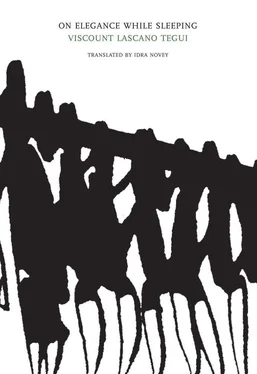The Middle Ages. Still? Yes, everything in that era had an obscure, sinister justification to it. All observation was still interwoven with faith, and faith is nothing more than atavistic fear, the instinctive cowardliness of man. If this fear could conceive of God, it could find a reason for anything — and everything had an explanation in the Middle Ages. The need for effects gave birth to stupendous causes. Children today understand this instinctively; they can only admire those obsolete causes, seeing such beauty in their inscrutability. People have lost the rhythm of the supernatural. Montaigne said:
Myself passing by Vitry-le-François, saw a man the Bishop of Soissons had, in confirmation, called Germain, whom all the inhabitants of the place had known to be a girl till two-and-twenty years of age, called Mary. He was, at the time of my being there, very full of beard, old, and not married. He told us, that by straining himself in a leap his male organs came out; and the girls of that place have, to this day, a song, wherein they advise one another not to take too great strides, for fear of being turned into men, as Mary Germain was.
NOVEMBER 27, 18—
Upon hearing Madame Roland had been executed, her husband, then in hiding on a farm, took off across the fields to commit suicide. A few peasants heard the shot. Another Girondist dead.
They buried him along the roadside, so close to the topsoil that children broke off little tree branches and played at who would have the courage to poke the cadaver first.
For a time, the corpse made the ground above it somewhat pliable. Until one sunny day it caved in. Over the next few months, this hole collected water, which the shepherds’ mastiffs came to lap up with pleasure.
DECEMBER 4, 18—
From birth I’ve felt the desire to improve human nature, which makes us all so fragile and imperfect. I’ve sanctified my life to this sole endeavor. Logic hasn’t aided my efforts. Logic must resist the same imperfections: it’s also human. Logic decrees, for instance, that you pour water over a fire to extinguish it. Myself, I’ve attempted to put out fires by carrying a flask inside a satchel.
I haven’t been successful.
What I have retained despite this failure is the consolation of having rehearsed a personal procedure, and one that isn’t necessarily beholden to the logic of men who, while they may know how to put out a fire, don’t know, conversely, how to be happy. I’ve always wanted to be happy. It was necessary to follow another path.
I didn’t discuss the problem with anyone. The notion of happiness no longer seems to be in fashion. But I’ve asked myself: Do I have a soul? And answered: Yes. Then, what is it? An imperceptible silhouette, following me about — external, seamless, vaporous, etcetera? No, these are simply more assumptions based on our flawed human logic. Spirit cannot be separated from matter; spirit is matter, or else it cannot have a life, color, shape, or anything else. The logic of man is the logic of the children of Macedonia, who are born philosophers — same as the children of Manaus (Brazil).
My mother cut and stitched our clothing but never sewed on our initials or put any more care into our shirts than she would into the hem of a kitchen rag. Despite her being rather uncouth, I grew strong and healthy, same as my poor brother — who later proved useful as a medical experiment.
Our dutiful mother had an artist’s temperament, I think, which was why she kept our clothing simple. I would like to compose these notes in the same straightforward way — with her same sincerity and plainness.
DECEMBER 31, 18—
We had a large carriage depot in Bougival. Come evening, these heretofore idle carriages would depart for Paris. They were our town’s only night owls. In a café, “Au Rendez-vous des chochers,” the drivers would get together for wine. Among those wide, paunchy men with their flushed faces, I met one who was exceptionally wide, paunchy, and flushed: his face was a beet with two little holes that opened to allow his eyes to peer out. On top of that, these eyes hid under a single eyebrow, like the forehead-strap on a muzzle.
The man was a rag torn off some holy cassock. A defrocked priest. He took me along with him until the road to Mont Valérien sometimes, recounting the secrets of his adventurous life as a coachman, enjoying himself immensely, as if he thought of himself as one of the Eugéne Sue characters that appeared weekly in the newspaper serials. On one of these trips, he told me this story, which clarified certain mysteries of his life:
“I was excommunicated by the Bishop of Orléans. A complete bastard. And then, one night at the Gare d’Austerlitz, this same bishop hails me and climbs into my coach and makes me drive him to a house on the outskirts of Paris. When we arrive, he steps out and asks me to wait.”
On the way to the house, the coachman longs to strangle his passenger. He moves along the streets waiting to feel the courage he doesn’t have, and as night falls, vengeance lights up his heart like the red lantern in his rickety carriage. I refer of course to that same heart that had previously been offered up to God upon the modest altar of his village parish. To the Villager God, carved in wood and painted with lime. But fat had made the excommunicated friar into a sweet man in the meantime. In-clemency had ennobled him, like the golden sprig of wheat hidden under a poverty of rotting hay. The coachman is incapable of putting an end to that tyrannical bishop, his enemy sitting comfortably just behind him on the cushions of his cab. When they finally arrive at their destination, the old bishop, in his full priestly attire, descends ceremoniously, perfumed with incense and rustling his silken vestments. He proceeds slowly up the steps of the house that awaits him.
Our driver searches for a nearby shop and buys some bread and cheese for his dinner. His fare continues to keep him waiting, though it’s already ten at night. All of a sudden, a frantic woman runs down the house’s front stairs shouting for help. The coachman leaps down.
“Dead!..Dead!” the crazed woman cries and disappears into the shadows at the end of the street. And that’s it.
No sound, no door creaking on its hinges, no other voices. The house is numb with death. Our driver leaves the snack he’s just started, along with his life after excommunication, spent over the coachbox, and begins to climb the stairs.
On the second-floor landing, a door opens. He enters and continues down a hallway covered with the scattered clothes of a person who was in a hurry to disrobe and at last reaches a lit room. Here there’s a bed and a stiff on the bed, his shirt half-opened, his stockings still on: the Monsignor in his final sleep. The room is full of fabulous colors — red, white, violet in all its splendor, the green of the bishop’s stockings, and just above the stockings an array of mixed-tone sores that run like buckles along the holy man’s disreputable calves. On his red and gray chest — gray from all the pale hair covering it — a string of silver medallions and gold gypsy coins. The terrible light of a single candle puts a halo of light over the bishop’s amethyst episcopal ring and a warm glow over the skin of his sex. Vomit, uneven in color, sullies the corpse’s head. His cassock would’ve fallen to the floor but has been held in place with a silvery rope. His skullcap sits on the night table with his pocket watch inside. Somehow, thanks perhaps to a trick of the light, everything around the corpse looks just as dead as he.
“Then, you see, from behind the drapes, came a sound like a cat that’s fallen asleep on a newspaper, changing its position. The bed creaked. The organdy curtains trembled. A slim woman emerged from between their bright damask pleats. My presence scared her out of her wits and she fled the room, clutching her breast, running right past me and down the corridor, letting out a startled scream: Mama!
Читать дальше












